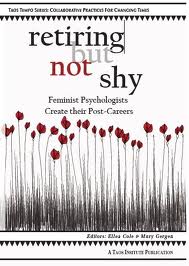Several years ago, a friend and I were talking about what we would do after we “retired.” I wanted to start a new career writing, teaching part-time, doing public speaking gigs, and blogging. She wanted to start a preschool! After decades at our corporate jobs, this was how we viewed retirement.
I was reminded of our conversation as I read the excellent book Retiring but not Shy, by Ellen Cole and Mary Gergen. The book is a collection of essays by women psychologists on the subject of their own retirement. Although some essays were by women who retired a while back, the ones I found most troubling were by those who were either considering retirement or had recently retired.
Like my friend and I, these bright, well-educated women had laundry lists of all the incredible new tasks and initiatives they would undertake. Retirement meant converting from busy/busy to busy/busy. Beyond financial security, many seemed afraid that giving up their jobs meant they would no longer “matter.” These stellar professionals, some of minority ethnicity, feared being marginalized by society after retirement.
Especially for us feminists, it’s hard to imagine walking away from the battlefield. We struggled against the social tide for those degrees, titles, professions and salaries. The achievement of professional stature became our our identity, our source of power, our protective shield.
When I gave up my profession, I didn’t feel special anymore, and looking back, this was where my post-retirement life got interesting. I found myself tackling some heavy questions.
- Did I have value to society without my work? Does anybody?
- Did I fear a judgment I’d attached to others who didn’t work? (As a society, this question has implications with elders as well as stay-at-home parents.)
- Would I ever have the confidence not to work? To give up positional power? To still see myself as special, even without the hard-won mantle of office?
Ultimately, the greatest triumph of my sixth decade was gaining a sense of self-worth exclusive of my profession. To value myself without the suit and heels meant I had to view the rest of society in a more forgiving way. to look beyond the uniform and titles – or lack thereof.
In the book, one of the writers asks: if work equates to feminism and independence, to what does retirement equate?
I have come to see retirement as a time of enlightenment and the letting go of ego.
One writer says “I believe that even in retirement women must contribute to make a difference, to be perceived as powerful and to have power.” But powerful in whose estimation? We cannot make society respect us – we can only respect ourselves. And as for feminist battles, can’t we just model feminist principles as we putter in the yard, go to church, or help out down at the shelter? Why do we need to start a new national/international effort toward whatsis?
Will we ever accept that we are good enough?








Recent Comments